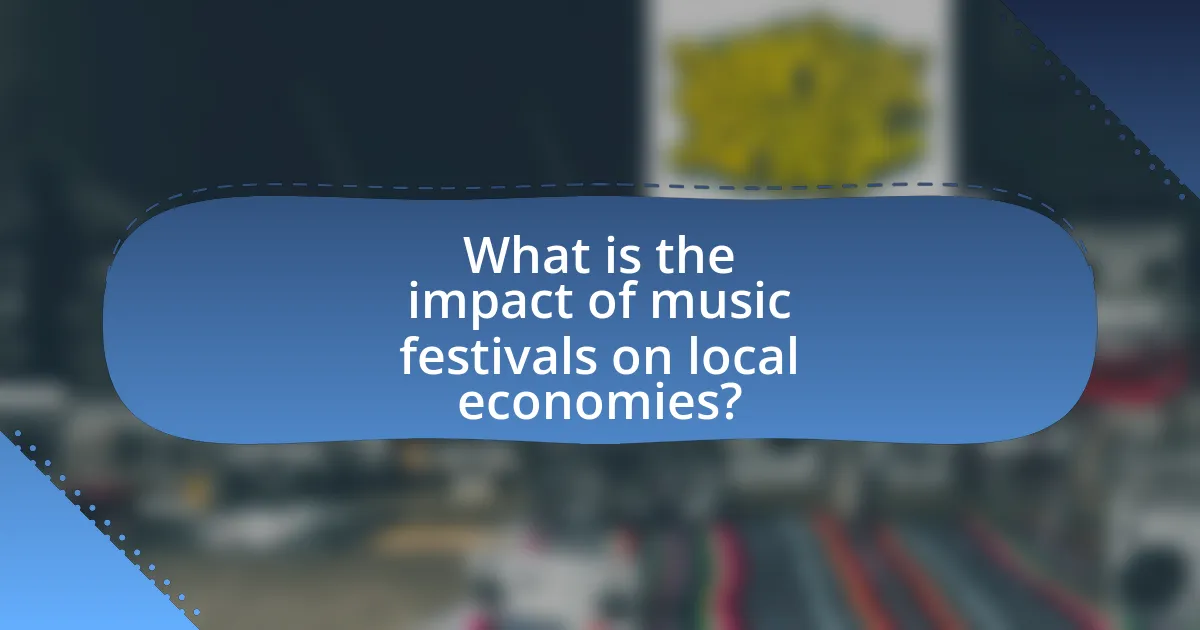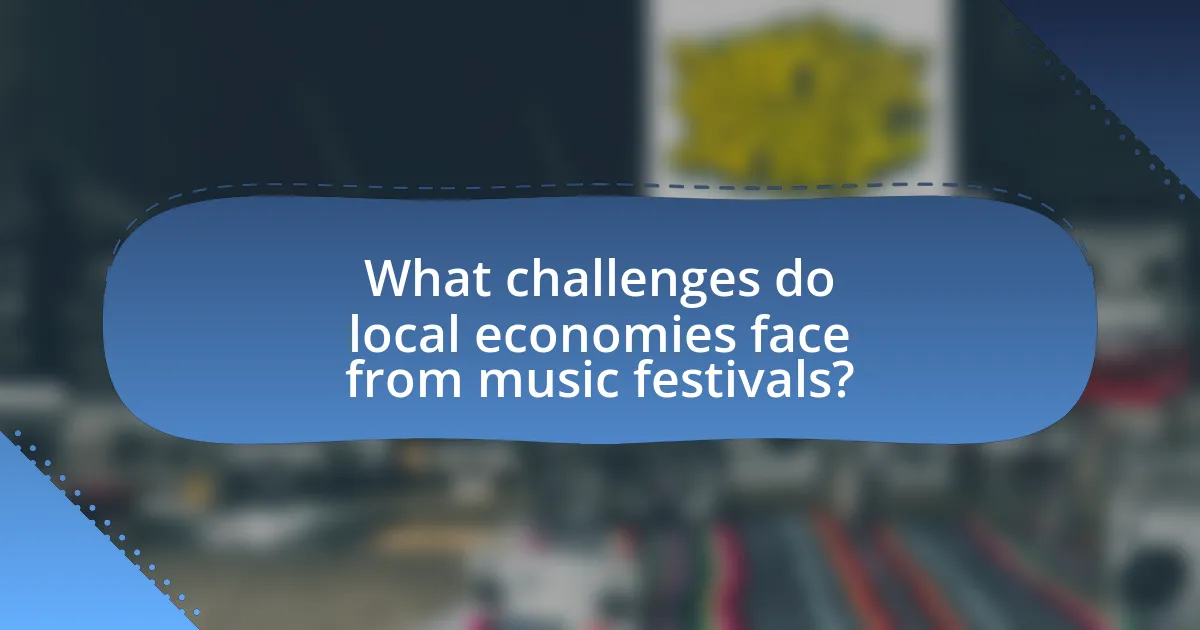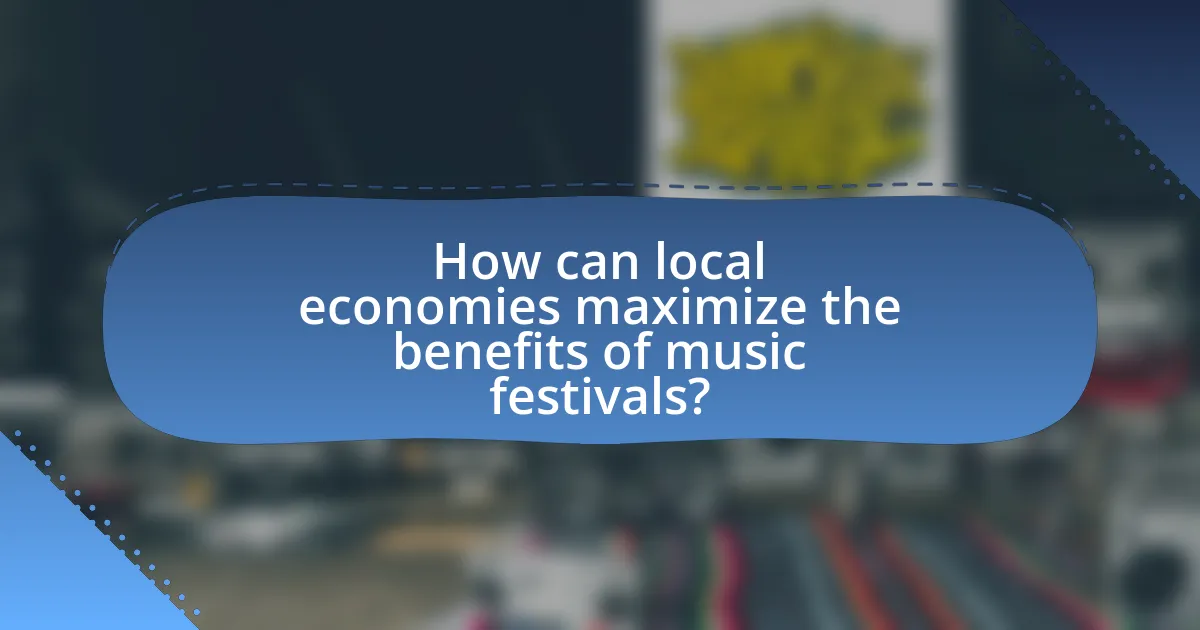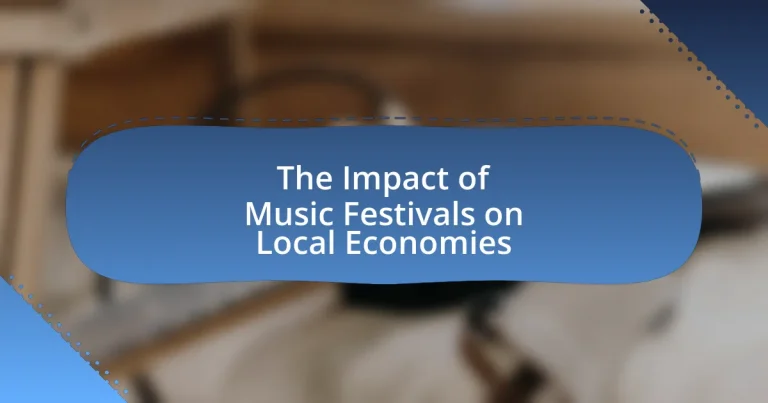Music festivals play a significant role in boosting local economies by generating substantial revenue through tourism, hospitality, and related services. They create jobs, stimulate local businesses, and enhance overall economic growth, as evidenced by events like the Coachella Valley Music and Arts Festival, which contributed approximately $403 million to its local economy in 2019. However, while festivals can lead to increased spending and job creation, they also present challenges such as infrastructure strain, economic disparities, and potential negative impacts on small businesses. This article explores the multifaceted effects of music festivals on local economies, including direct financial benefits, job creation, and strategies to mitigate negative impacts while maximizing economic advantages.

What is the impact of music festivals on local economies?
Music festivals significantly boost local economies by generating revenue through tourism, hospitality, and related services. For instance, a study by the University of California found that music festivals can contribute millions of dollars to local economies, with attendees spending on accommodations, food, and transportation. In 2019, the Coachella Valley Music and Arts Festival generated an estimated $403 million for the local economy, highlighting the substantial financial impact such events can have. Additionally, music festivals create jobs and stimulate local businesses, further enhancing economic growth in the area.
How do music festivals contribute to local economic growth?
Music festivals contribute to local economic growth by generating significant revenue through tourism, job creation, and increased spending in local businesses. For instance, a study by the National Endowment for the Arts found that music festivals can attract thousands of attendees, leading to increased hotel bookings, restaurant patronage, and retail sales. In 2019, the Coachella Valley Music and Arts Festival generated an estimated $403 million in economic impact for the local economy, supporting over 4,000 jobs. This influx of visitors stimulates various sectors, including hospitality, transportation, and entertainment, thereby enhancing overall economic activity in the region.
What are the direct financial benefits of hosting a music festival?
Hosting a music festival generates direct financial benefits such as increased tourism revenue, local business sales, and job creation. Festivals attract attendees who spend money on accommodations, food, transportation, and merchandise, significantly boosting the local economy. For instance, a study by the National Endowment for the Arts found that music festivals can generate millions in economic impact; for example, the Coachella Valley Music and Arts Festival reportedly contributes over $400 million to the local economy annually. Additionally, local businesses, including hotels and restaurants, experience increased sales during festival weekends, further solidifying the financial advantages of hosting such events.
How do music festivals influence local job creation?
Music festivals significantly influence local job creation by generating employment opportunities in various sectors such as hospitality, retail, and event management. For instance, a study by the National Endowment for the Arts found that music festivals can create thousands of temporary jobs, including positions for security personnel, food vendors, and ticket sales staff. Additionally, local businesses often hire extra staff to accommodate the influx of festival-goers, leading to increased demand for services like transportation and accommodation. This multifaceted job creation not only supports the local economy during the festival but can also have lasting effects by promoting ongoing tourism and business growth in the area.
What are the indirect effects of music festivals on local economies?
Music festivals have significant indirect effects on local economies, primarily through increased tourism, job creation, and enhanced community engagement. These events attract visitors who spend money on accommodations, food, and local attractions, leading to a boost in sales for local businesses. For instance, a study by the National Endowment for the Arts found that music festivals can generate millions in economic impact for host cities, with some events reporting up to $10 million in local spending. Additionally, festivals often create temporary jobs in areas such as hospitality and event management, further stimulating the local job market. Furthermore, music festivals foster community pride and cohesion, which can lead to long-term economic benefits as residents become more invested in their local area.
How do music festivals affect local businesses and services?
Music festivals significantly boost local businesses and services by increasing foot traffic and consumer spending in the area. For instance, a study conducted by the University of California found that music festivals can generate up to $10 million in economic impact for host cities, benefiting hotels, restaurants, and retail shops. Local accommodations often experience full bookings, while restaurants and bars see a surge in customers, leading to increased sales and job creation. Additionally, vendors and service providers, such as transportation and event staffing companies, also gain from the influx of festival-goers, further enhancing the local economy.
What role do music festivals play in tourism development?
Music festivals significantly contribute to tourism development by attracting large numbers of visitors, which boosts local economies. These events generate revenue through ticket sales, accommodation, food, and merchandise, creating jobs and stimulating various sectors such as hospitality and transportation. For instance, a study by the University of California found that music festivals can increase local tourism revenue by up to 30% during the event period, demonstrating their economic impact. Additionally, festivals enhance a destination’s visibility and appeal, encouraging repeat visits and long-term tourism growth.

What challenges do local economies face from music festivals?
Local economies face several challenges from music festivals, including increased costs, infrastructure strain, and potential negative impacts on local businesses. The influx of visitors can lead to higher demand for services, which may overwhelm local resources and result in increased prices for residents. Additionally, the temporary nature of festival-related economic boosts can create volatility, making it difficult for local businesses to sustain growth. Studies have shown that while festivals can generate short-term revenue, they often do not provide lasting economic benefits, as evidenced by research from the University of California, which found that many local businesses do not see a significant increase in sales post-festival.
How can music festivals lead to economic disparities in local communities?
Music festivals can lead to economic disparities in local communities by disproportionately benefiting certain businesses and demographics while neglecting others. For instance, large festivals often attract affluent attendees who spend significantly on high-end accommodations, dining, and merchandise, thereby boosting profits for upscale businesses. In contrast, local small businesses may struggle to compete, resulting in unequal economic growth. A study by the University of California found that while festivals can generate millions in revenue, the wealth generated often does not trickle down to lower-income residents, exacerbating existing inequalities. Additionally, the influx of tourists can drive up local prices, making it difficult for long-term residents to afford basic necessities, further widening the economic gap within the community.
What are the potential negative impacts on small businesses?
The potential negative impacts on small businesses include increased competition, disruption of regular customer flow, and rising operational costs. Music festivals can attract large crowds, which may divert customers away from local shops and restaurants that typically serve the community. Additionally, small businesses may face higher costs due to increased demand for supplies and services, leading to inflated prices. A study by the National Federation of Independent Business indicates that 30% of small business owners report a decline in sales during large events, highlighting the adverse effects on their revenue.
How do music festivals affect housing and rental markets?
Music festivals significantly increase demand for housing and rental markets in host cities. During festival weekends, local accommodations often experience a surge in occupancy rates, leading to higher rental prices and short-term rental listings. For instance, a study conducted by the University of California found that cities hosting major music festivals can see rental prices increase by up to 30% during the event period. This spike is driven by the influx of attendees seeking nearby lodging, which can strain local housing availability and affordability. Additionally, property owners may choose to capitalize on the festival by converting long-term rentals into short-term vacation rentals, further exacerbating housing shortages for residents.
What strategies can mitigate the negative impacts of music festivals?
Implementing comprehensive waste management systems can mitigate the negative impacts of music festivals. Effective waste management reduces litter and environmental degradation, which are common issues associated with large gatherings. For instance, festivals that adopt recycling and composting initiatives can divert up to 70% of waste from landfills, as demonstrated by the Glastonbury Festival, which achieved a 50% recycling rate in 2019. Additionally, establishing noise control measures, such as sound barriers and designated quiet zones, can minimize disturbances to local communities, thereby fostering better relationships between festival organizers and residents. Furthermore, engaging local businesses in festival planning can enhance economic benefits while addressing concerns about overcrowding and resource strain. By implementing these strategies, music festivals can significantly lessen their adverse effects on local economies and communities.
How can local governments support equitable economic benefits?
Local governments can support equitable economic benefits by implementing policies that ensure fair distribution of resources and opportunities among all community members. For instance, they can establish grant programs specifically for local artists and small businesses to participate in music festivals, thereby promoting inclusivity. Research shows that music festivals can generate significant revenue; for example, the 2019 Coachella Valley Music and Arts Festival contributed over $400 million to the local economy, highlighting the potential for local governments to leverage such events for broader economic impact. Additionally, local governments can facilitate partnerships between festival organizers and community organizations to ensure that marginalized groups benefit from the economic activities generated by these festivals.
What best practices can festival organizers adopt for community engagement?
Festival organizers can adopt several best practices for community engagement, including collaborating with local businesses, involving community members in planning, and promoting local culture. Collaborating with local businesses can enhance economic benefits, as studies show that festivals can increase local spending by up to 30%. Involving community members in the planning process fosters a sense of ownership and can lead to higher attendance and participation rates. Additionally, promoting local culture through performances, food, and art can strengthen community identity and attract visitors, further boosting the local economy.

How can local economies maximize the benefits of music festivals?
Local economies can maximize the benefits of music festivals by strategically investing in infrastructure, promoting local businesses, and engaging the community. By enhancing transportation, accommodation, and amenities, local governments can improve the festival experience, attracting more attendees. For instance, a study by the National Endowment for the Arts found that well-organized festivals can generate significant economic impact, with some events bringing in millions in revenue for local businesses. Additionally, partnerships with local vendors and artists can create a vibrant marketplace, ensuring that a larger share of festival spending remains within the community. Engaging local residents in planning and volunteering fosters a sense of ownership and pride, further enhancing the festival’s success and sustainability.
What are effective marketing strategies for local businesses during festivals?
Effective marketing strategies for local businesses during festivals include leveraging social media, collaborating with festival organizers, and offering festival-specific promotions. Social media platforms allow businesses to engage with attendees in real-time, share special offers, and create buzz around their participation. Collaborating with festival organizers can enhance visibility through sponsorships or partnerships, ensuring that businesses are featured in promotional materials. Additionally, offering festival-specific promotions, such as discounts or exclusive products, can attract festival-goers looking for unique experiences. According to a study by the National Endowment for the Arts, local businesses that actively participate in community events see a 20% increase in foot traffic during festivals, demonstrating the effectiveness of these strategies.
How can partnerships between festivals and local businesses enhance economic impact?
Partnerships between festivals and local businesses enhance economic impact by creating a synergistic relationship that drives increased revenue for both entities. When festivals collaborate with local businesses, they attract more visitors who spend money on accommodations, food, and services, thereby boosting the local economy. For instance, a study by the National Endowment for the Arts found that festivals can generate up to $1.5 million in economic activity for a community, with local businesses seeing a significant uptick in sales during festival periods. This collaboration not only increases foot traffic but also fosters community engagement and supports local employment, further solidifying the economic benefits of such partnerships.
What role does community involvement play in festival success?
Community involvement is crucial for festival success as it fosters local support, enhances participation, and drives economic benefits. When community members actively engage in planning and executing festivals, they contribute to a sense of ownership and pride, which can lead to higher attendance and volunteer participation. According to a study by the National Endowment for the Arts, festivals that incorporate local input and talent not only attract larger crowds but also generate significant economic impact, with local businesses seeing increased sales and tourism revenue. This symbiotic relationship between festivals and the community underscores the importance of collaboration in achieving successful outcomes.
What lessons can be learned from successful music festivals?
Successful music festivals demonstrate the importance of community engagement and economic stimulation. They effectively mobilize local resources, creating jobs and boosting tourism. For instance, the Coachella Valley Music and Arts Festival generates approximately $403 million annually for the local economy, showcasing how festivals can significantly enhance local business revenues. Additionally, successful festivals prioritize sustainability and inclusivity, ensuring that diverse audiences can participate while minimizing environmental impact. This approach not only fosters a positive community image but also attracts a broader demographic, further enhancing economic benefits.
Which case studies illustrate positive economic impacts of music festivals?
Case studies illustrating positive economic impacts of music festivals include the Coachella Valley Music and Arts Festival and the Glastonbury Festival. The Coachella Festival, held in California, generates approximately $704 million in economic impact annually, supporting local businesses and creating thousands of jobs. Similarly, the Glastonbury Festival in the UK contributes around £100 million to the local economy, with significant spending on accommodation, food, and transportation by attendees. These figures demonstrate the substantial financial benefits music festivals can bring to their host communities.
How can local economies replicate successful festival models?
Local economies can replicate successful festival models by analyzing and adapting the key elements that contributed to the success of those festivals. This involves studying factors such as target demographics, marketing strategies, community involvement, and logistical planning. For instance, the South by Southwest (SXSW) festival in Austin, Texas, has thrived due to its focus on diverse programming, strong local partnerships, and effective use of social media for promotion. By implementing similar strategies, local economies can attract visitors, boost local businesses, and enhance community engagement. Research indicates that festivals can generate significant economic impact; for example, a study by the National Endowment for the Arts found that arts festivals can contribute millions to local economies through tourism and spending.
What practical tips can local economies implement to benefit from music festivals?
Local economies can benefit from music festivals by enhancing infrastructure, promoting local businesses, and engaging the community. Improving transportation and accommodation facilities can accommodate increased visitors, as seen in cities like Austin, Texas, which hosts South by Southwest and experiences significant economic boosts. Local businesses can be promoted through vendor opportunities at festivals, which can increase sales; for example, studies show that local vendors at festivals can see a 30% increase in revenue during events. Additionally, engaging the community through volunteer programs can foster local pride and participation, leading to sustained interest in future events.


